Analysis of Ethical Dilemma and Moral Values in Social Care Context
VerifiedAdded on 2022/08/25
|10
|3298
|27
Essay
AI Summary
This essay delves into the ethical dilemma of assisted dying within the social care environment, examining its complexities and implications. It defines ethics and ethical dilemmas, emphasizing their importance in guiding professional behavior. The essay explores assisted dying as a specific ethical challenge, discussing its ethical and legal considerations, including human rights and social justice. It analyzes how ethical approaches, professional ethics, and moral principles influence decision-making, considering the conflicts between personal values and professional obligations. The essay also examines the impact of ethical theories like virtue ethics and utilitarianism on healthcare practices. Furthermore, it explores the role of ethical and legal issues, moral constraints, and professional values in shaping decisions. The essay concludes by reflecting on the influence of personal values and morals on professional practice, highlighting the importance of fairness, honesty, and reciprocity in providing care. The essay provides a comprehensive overview of the ethical considerations surrounding end-of-life care, offering valuable insights into the challenges faced by healthcare professionals in navigating these complex issues.
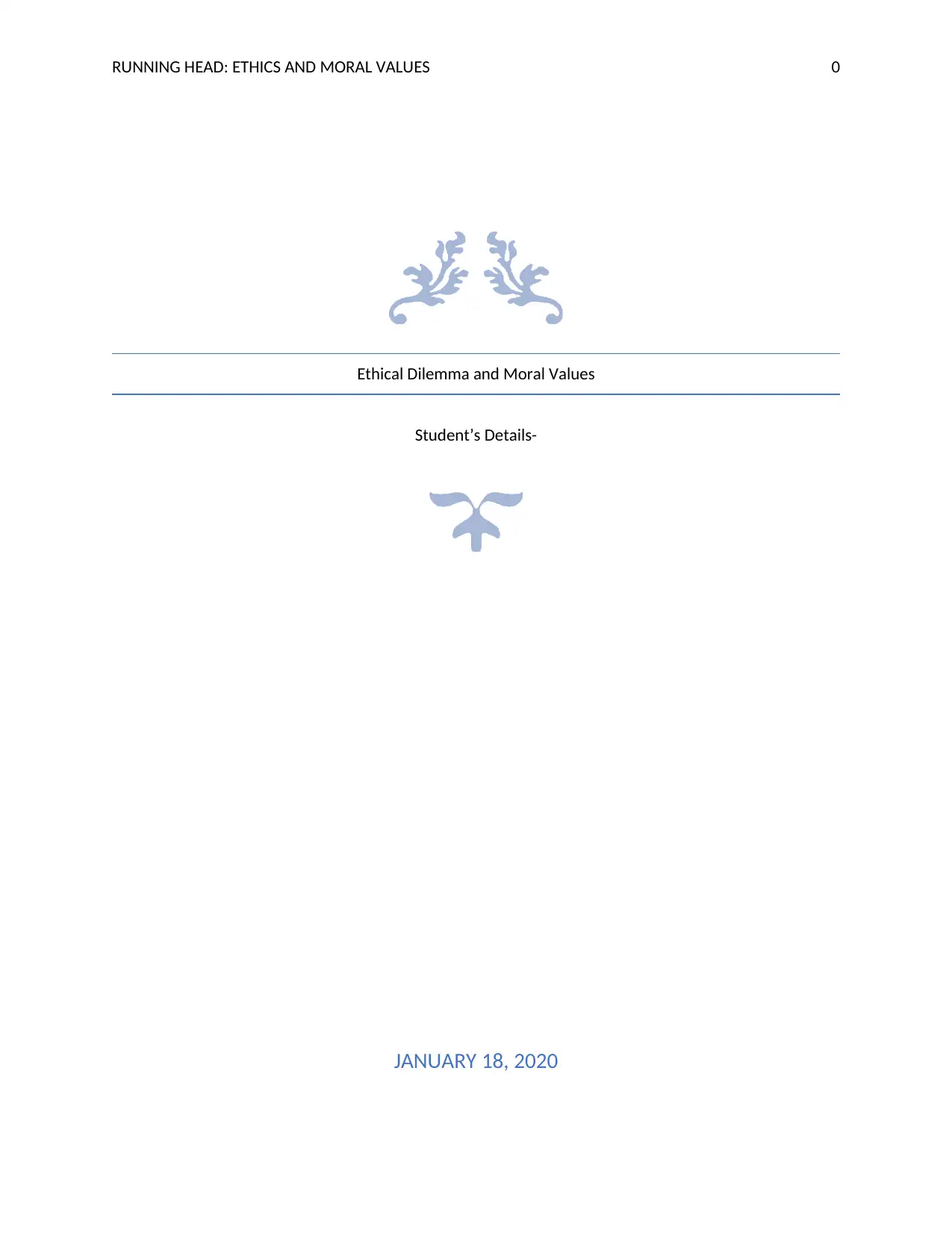
RUNNING HEAD: ETHICS AND MORAL VALUES 0
Ethical Dilemma and Moral Values
Student’s Details-
JANUARY 18, 2020
Ethical Dilemma and Moral Values
Student’s Details-
JANUARY 18, 2020
Paraphrase This Document
Need a fresh take? Get an instant paraphrase of this document with our AI Paraphraser
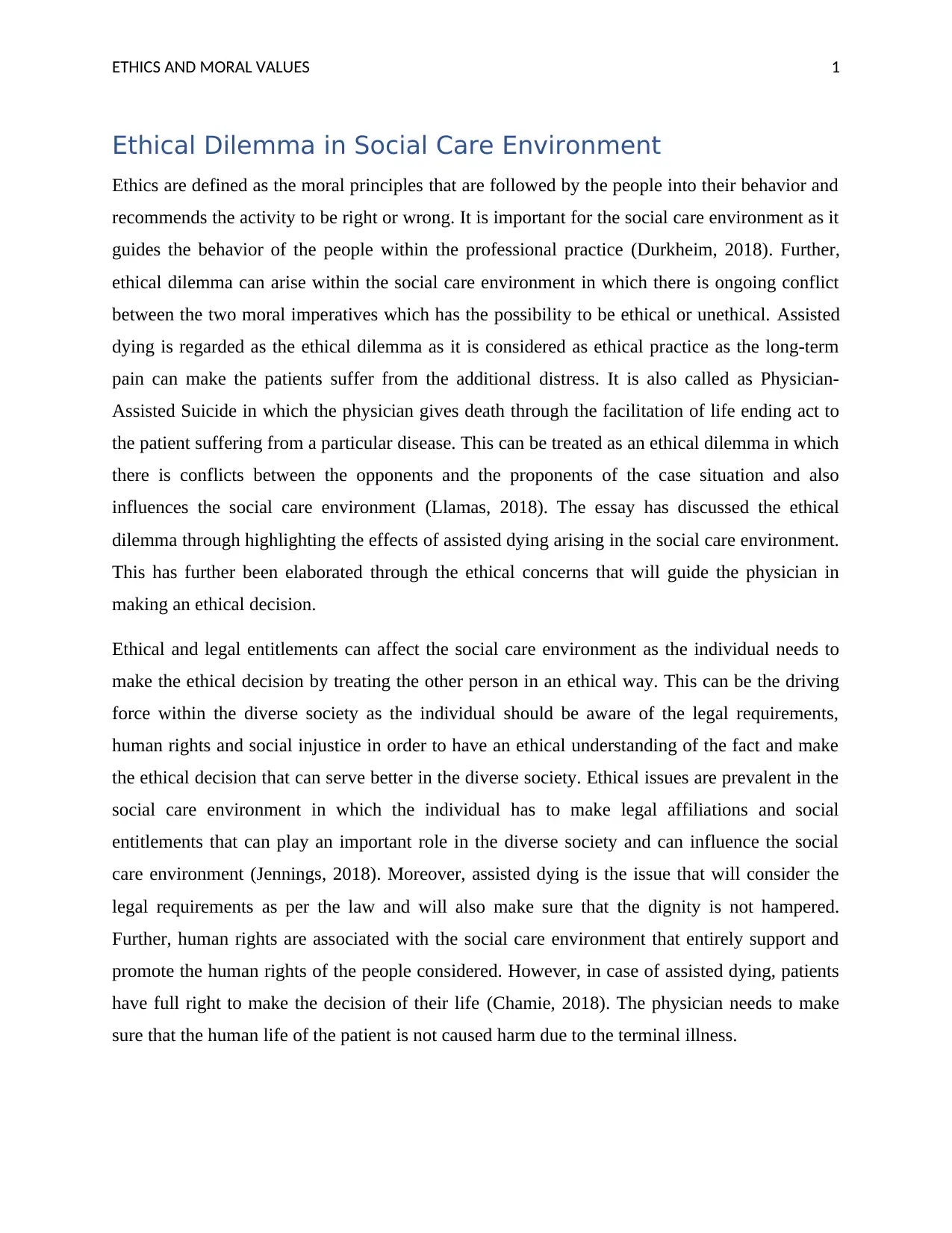
ETHICS AND MORAL VALUES 1
Ethical Dilemma in Social Care Environment
Ethics are defined as the moral principles that are followed by the people into their behavior and
recommends the activity to be right or wrong. It is important for the social care environment as it
guides the behavior of the people within the professional practice (Durkheim, 2018). Further,
ethical dilemma can arise within the social care environment in which there is ongoing conflict
between the two moral imperatives which has the possibility to be ethical or unethical. Assisted
dying is regarded as the ethical dilemma as it is considered as ethical practice as the long-term
pain can make the patients suffer from the additional distress. It is also called as Physician-
Assisted Suicide in which the physician gives death through the facilitation of life ending act to
the patient suffering from a particular disease. This can be treated as an ethical dilemma in which
there is conflicts between the opponents and the proponents of the case situation and also
influences the social care environment (Llamas, 2018). The essay has discussed the ethical
dilemma through highlighting the effects of assisted dying arising in the social care environment.
This has further been elaborated through the ethical concerns that will guide the physician in
making an ethical decision.
Ethical and legal entitlements can affect the social care environment as the individual needs to
make the ethical decision by treating the other person in an ethical way. This can be the driving
force within the diverse society as the individual should be aware of the legal requirements,
human rights and social injustice in order to have an ethical understanding of the fact and make
the ethical decision that can serve better in the diverse society. Ethical issues are prevalent in the
social care environment in which the individual has to make legal affiliations and social
entitlements that can play an important role in the diverse society and can influence the social
care environment (Jennings, 2018). Moreover, assisted dying is the issue that will consider the
legal requirements as per the law and will also make sure that the dignity is not hampered.
Further, human rights are associated with the social care environment that entirely support and
promote the human rights of the people considered. However, in case of assisted dying, patients
have full right to make the decision of their life (Chamie, 2018). The physician needs to make
sure that the human life of the patient is not caused harm due to the terminal illness.
Ethical Dilemma in Social Care Environment
Ethics are defined as the moral principles that are followed by the people into their behavior and
recommends the activity to be right or wrong. It is important for the social care environment as it
guides the behavior of the people within the professional practice (Durkheim, 2018). Further,
ethical dilemma can arise within the social care environment in which there is ongoing conflict
between the two moral imperatives which has the possibility to be ethical or unethical. Assisted
dying is regarded as the ethical dilemma as it is considered as ethical practice as the long-term
pain can make the patients suffer from the additional distress. It is also called as Physician-
Assisted Suicide in which the physician gives death through the facilitation of life ending act to
the patient suffering from a particular disease. This can be treated as an ethical dilemma in which
there is conflicts between the opponents and the proponents of the case situation and also
influences the social care environment (Llamas, 2018). The essay has discussed the ethical
dilemma through highlighting the effects of assisted dying arising in the social care environment.
This has further been elaborated through the ethical concerns that will guide the physician in
making an ethical decision.
Ethical and legal entitlements can affect the social care environment as the individual needs to
make the ethical decision by treating the other person in an ethical way. This can be the driving
force within the diverse society as the individual should be aware of the legal requirements,
human rights and social injustice in order to have an ethical understanding of the fact and make
the ethical decision that can serve better in the diverse society. Ethical issues are prevalent in the
social care environment in which the individual has to make legal affiliations and social
entitlements that can play an important role in the diverse society and can influence the social
care environment (Jennings, 2018). Moreover, assisted dying is the issue that will consider the
legal requirements as per the law and will also make sure that the dignity is not hampered.
Further, human rights are associated with the social care environment that entirely support and
promote the human rights of the people considered. However, in case of assisted dying, patients
have full right to make the decision of their life (Chamie, 2018). The physician needs to make
sure that the human life of the patient is not caused harm due to the terminal illness.
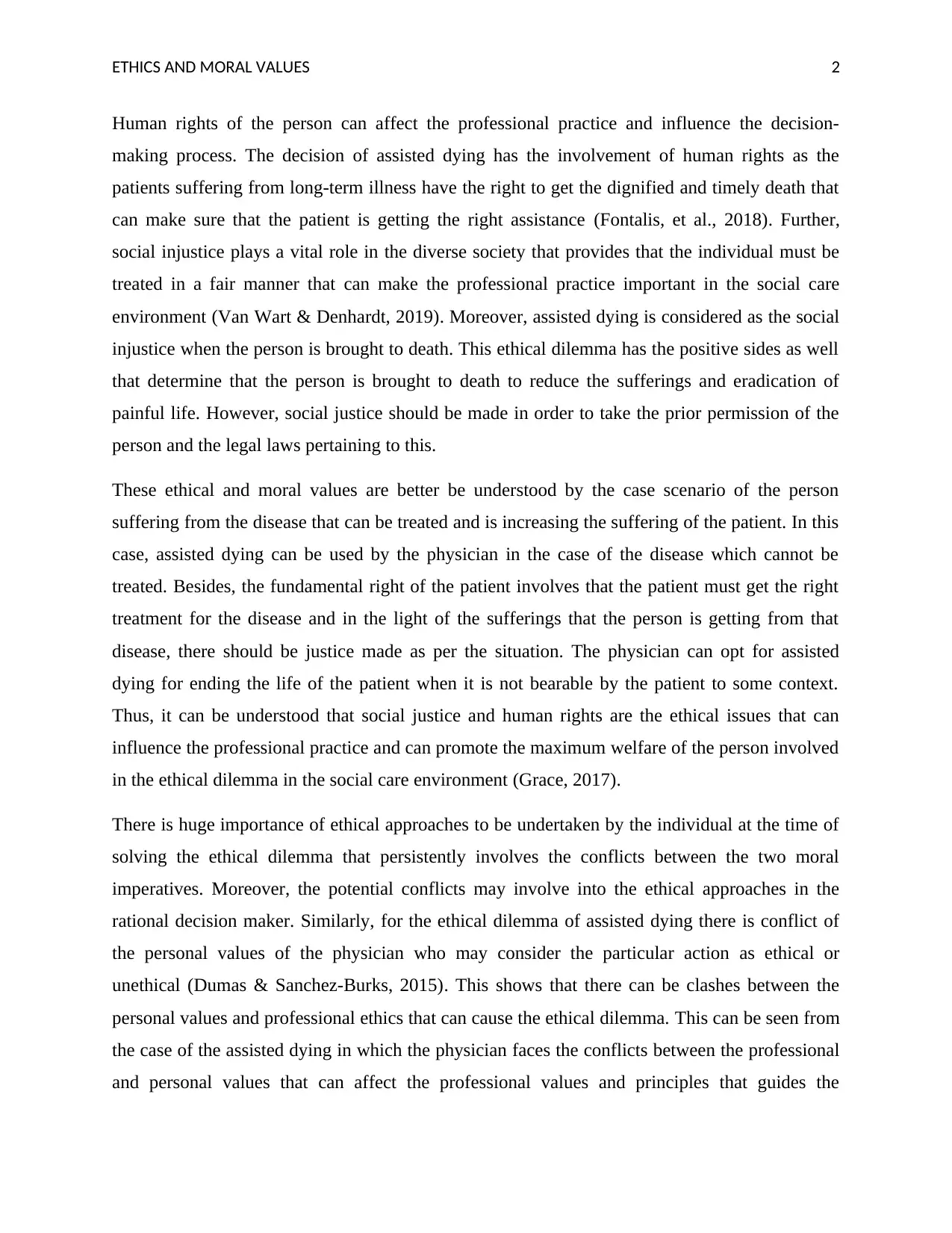
ETHICS AND MORAL VALUES 2
Human rights of the person can affect the professional practice and influence the decision-
making process. The decision of assisted dying has the involvement of human rights as the
patients suffering from long-term illness have the right to get the dignified and timely death that
can make sure that the patient is getting the right assistance (Fontalis, et al., 2018). Further,
social injustice plays a vital role in the diverse society that provides that the individual must be
treated in a fair manner that can make the professional practice important in the social care
environment (Van Wart & Denhardt, 2019). Moreover, assisted dying is considered as the social
injustice when the person is brought to death. This ethical dilemma has the positive sides as well
that determine that the person is brought to death to reduce the sufferings and eradication of
painful life. However, social justice should be made in order to take the prior permission of the
person and the legal laws pertaining to this.
These ethical and moral values are better be understood by the case scenario of the person
suffering from the disease that can be treated and is increasing the suffering of the patient. In this
case, assisted dying can be used by the physician in the case of the disease which cannot be
treated. Besides, the fundamental right of the patient involves that the patient must get the right
treatment for the disease and in the light of the sufferings that the person is getting from that
disease, there should be justice made as per the situation. The physician can opt for assisted
dying for ending the life of the patient when it is not bearable by the patient to some context.
Thus, it can be understood that social justice and human rights are the ethical issues that can
influence the professional practice and can promote the maximum welfare of the person involved
in the ethical dilemma in the social care environment (Grace, 2017).
There is huge importance of ethical approaches to be undertaken by the individual at the time of
solving the ethical dilemma that persistently involves the conflicts between the two moral
imperatives. Moreover, the potential conflicts may involve into the ethical approaches in the
rational decision maker. Similarly, for the ethical dilemma of assisted dying there is conflict of
the personal values of the physician who may consider the particular action as ethical or
unethical (Dumas & Sanchez-Burks, 2015). This shows that there can be clashes between the
personal values and professional ethics that can cause the ethical dilemma. This can be seen from
the case of the assisted dying in which the physician faces the conflicts between the professional
and personal values that can affect the professional values and principles that guides the
Human rights of the person can affect the professional practice and influence the decision-
making process. The decision of assisted dying has the involvement of human rights as the
patients suffering from long-term illness have the right to get the dignified and timely death that
can make sure that the patient is getting the right assistance (Fontalis, et al., 2018). Further,
social injustice plays a vital role in the diverse society that provides that the individual must be
treated in a fair manner that can make the professional practice important in the social care
environment (Van Wart & Denhardt, 2019). Moreover, assisted dying is considered as the social
injustice when the person is brought to death. This ethical dilemma has the positive sides as well
that determine that the person is brought to death to reduce the sufferings and eradication of
painful life. However, social justice should be made in order to take the prior permission of the
person and the legal laws pertaining to this.
These ethical and moral values are better be understood by the case scenario of the person
suffering from the disease that can be treated and is increasing the suffering of the patient. In this
case, assisted dying can be used by the physician in the case of the disease which cannot be
treated. Besides, the fundamental right of the patient involves that the patient must get the right
treatment for the disease and in the light of the sufferings that the person is getting from that
disease, there should be justice made as per the situation. The physician can opt for assisted
dying for ending the life of the patient when it is not bearable by the patient to some context.
Thus, it can be understood that social justice and human rights are the ethical issues that can
influence the professional practice and can promote the maximum welfare of the person involved
in the ethical dilemma in the social care environment (Grace, 2017).
There is huge importance of ethical approaches to be undertaken by the individual at the time of
solving the ethical dilemma that persistently involves the conflicts between the two moral
imperatives. Moreover, the potential conflicts may involve into the ethical approaches in the
rational decision maker. Similarly, for the ethical dilemma of assisted dying there is conflict of
the personal values of the physician who may consider the particular action as ethical or
unethical (Dumas & Sanchez-Burks, 2015). This shows that there can be clashes between the
personal values and professional ethics that can cause the ethical dilemma. This can be seen from
the case of the assisted dying in which the physician faces the conflicts between the professional
and personal values that can affect the professional values and principles that guides the
⊘ This is a preview!⊘
Do you want full access?
Subscribe today to unlock all pages.

Trusted by 1+ million students worldwide
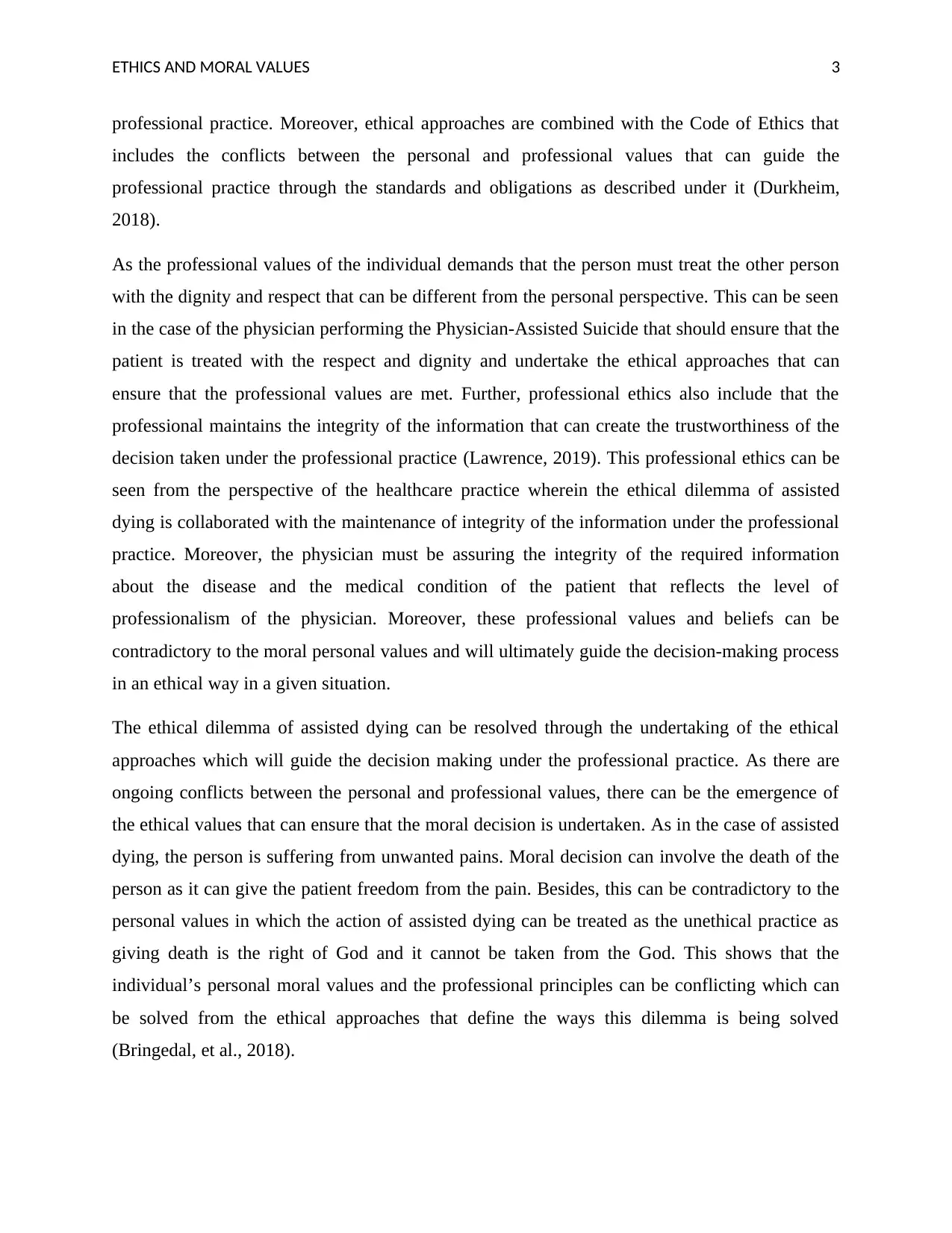
ETHICS AND MORAL VALUES 3
professional practice. Moreover, ethical approaches are combined with the Code of Ethics that
includes the conflicts between the personal and professional values that can guide the
professional practice through the standards and obligations as described under it (Durkheim,
2018).
As the professional values of the individual demands that the person must treat the other person
with the dignity and respect that can be different from the personal perspective. This can be seen
in the case of the physician performing the Physician-Assisted Suicide that should ensure that the
patient is treated with the respect and dignity and undertake the ethical approaches that can
ensure that the professional values are met. Further, professional ethics also include that the
professional maintains the integrity of the information that can create the trustworthiness of the
decision taken under the professional practice (Lawrence, 2019). This professional ethics can be
seen from the perspective of the healthcare practice wherein the ethical dilemma of assisted
dying is collaborated with the maintenance of integrity of the information under the professional
practice. Moreover, the physician must be assuring the integrity of the required information
about the disease and the medical condition of the patient that reflects the level of
professionalism of the physician. Moreover, these professional values and beliefs can be
contradictory to the moral personal values and will ultimately guide the decision-making process
in an ethical way in a given situation.
The ethical dilemma of assisted dying can be resolved through the undertaking of the ethical
approaches which will guide the decision making under the professional practice. As there are
ongoing conflicts between the personal and professional values, there can be the emergence of
the ethical values that can ensure that the moral decision is undertaken. As in the case of assisted
dying, the person is suffering from unwanted pains. Moral decision can involve the death of the
person as it can give the patient freedom from the pain. Besides, this can be contradictory to the
personal values in which the action of assisted dying can be treated as the unethical practice as
giving death is the right of God and it cannot be taken from the God. This shows that the
individual’s personal moral values and the professional principles can be conflicting which can
be solved from the ethical approaches that define the ways this dilemma is being solved
(Bringedal, et al., 2018).
professional practice. Moreover, ethical approaches are combined with the Code of Ethics that
includes the conflicts between the personal and professional values that can guide the
professional practice through the standards and obligations as described under it (Durkheim,
2018).
As the professional values of the individual demands that the person must treat the other person
with the dignity and respect that can be different from the personal perspective. This can be seen
in the case of the physician performing the Physician-Assisted Suicide that should ensure that the
patient is treated with the respect and dignity and undertake the ethical approaches that can
ensure that the professional values are met. Further, professional ethics also include that the
professional maintains the integrity of the information that can create the trustworthiness of the
decision taken under the professional practice (Lawrence, 2019). This professional ethics can be
seen from the perspective of the healthcare practice wherein the ethical dilemma of assisted
dying is collaborated with the maintenance of integrity of the information under the professional
practice. Moreover, the physician must be assuring the integrity of the required information
about the disease and the medical condition of the patient that reflects the level of
professionalism of the physician. Moreover, these professional values and beliefs can be
contradictory to the moral personal values and will ultimately guide the decision-making process
in an ethical way in a given situation.
The ethical dilemma of assisted dying can be resolved through the undertaking of the ethical
approaches which will guide the decision making under the professional practice. As there are
ongoing conflicts between the personal and professional values, there can be the emergence of
the ethical values that can ensure that the moral decision is undertaken. As in the case of assisted
dying, the person is suffering from unwanted pains. Moral decision can involve the death of the
person as it can give the patient freedom from the pain. Besides, this can be contradictory to the
personal values in which the action of assisted dying can be treated as the unethical practice as
giving death is the right of God and it cannot be taken from the God. This shows that the
individual’s personal moral values and the professional principles can be conflicting which can
be solved from the ethical approaches that define the ways this dilemma is being solved
(Bringedal, et al., 2018).
Paraphrase This Document
Need a fresh take? Get an instant paraphrase of this document with our AI Paraphraser
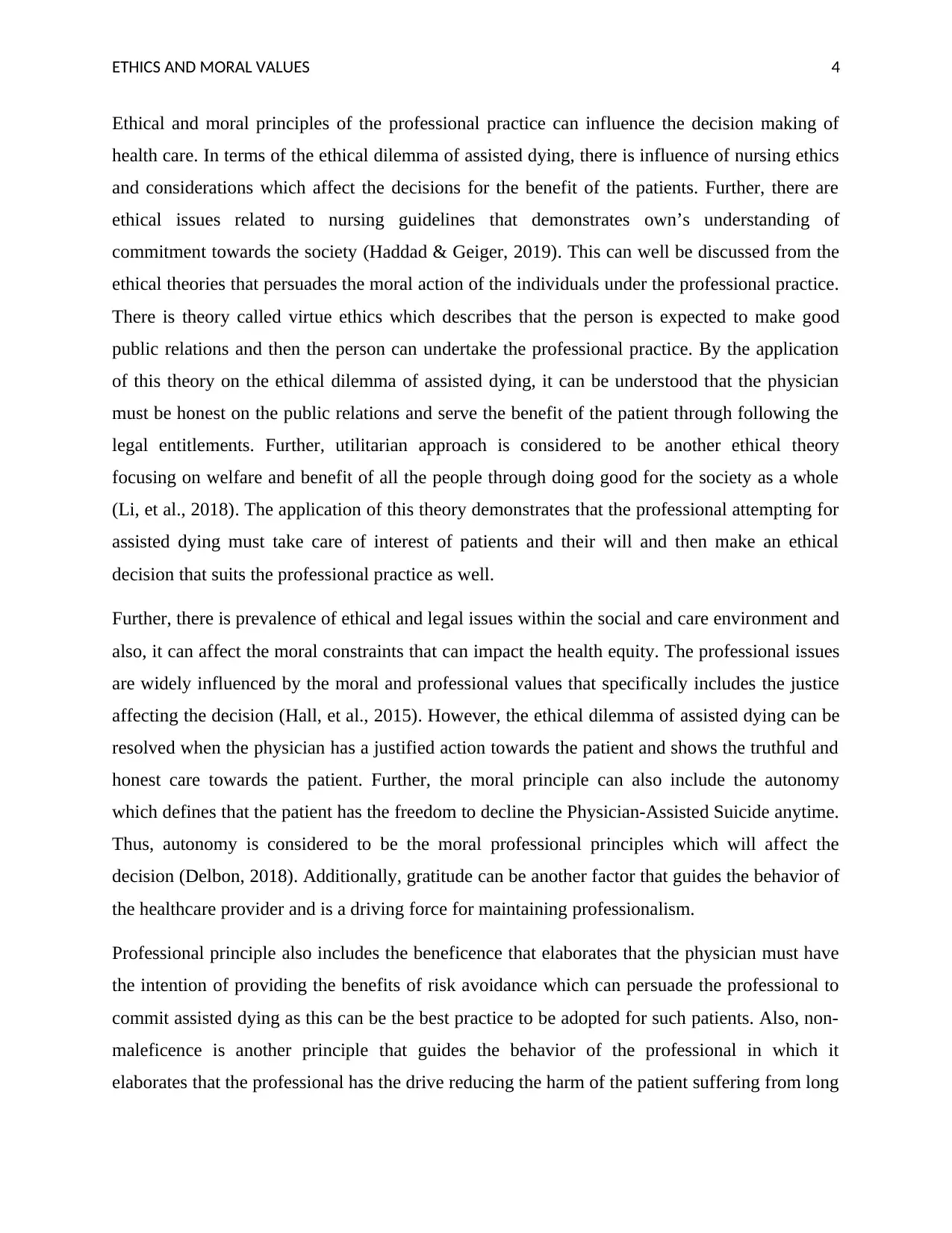
ETHICS AND MORAL VALUES 4
Ethical and moral principles of the professional practice can influence the decision making of
health care. In terms of the ethical dilemma of assisted dying, there is influence of nursing ethics
and considerations which affect the decisions for the benefit of the patients. Further, there are
ethical issues related to nursing guidelines that demonstrates own’s understanding of
commitment towards the society (Haddad & Geiger, 2019). This can well be discussed from the
ethical theories that persuades the moral action of the individuals under the professional practice.
There is theory called virtue ethics which describes that the person is expected to make good
public relations and then the person can undertake the professional practice. By the application
of this theory on the ethical dilemma of assisted dying, it can be understood that the physician
must be honest on the public relations and serve the benefit of the patient through following the
legal entitlements. Further, utilitarian approach is considered to be another ethical theory
focusing on welfare and benefit of all the people through doing good for the society as a whole
(Li, et al., 2018). The application of this theory demonstrates that the professional attempting for
assisted dying must take care of interest of patients and their will and then make an ethical
decision that suits the professional practice as well.
Further, there is prevalence of ethical and legal issues within the social and care environment and
also, it can affect the moral constraints that can impact the health equity. The professional issues
are widely influenced by the moral and professional values that specifically includes the justice
affecting the decision (Hall, et al., 2015). However, the ethical dilemma of assisted dying can be
resolved when the physician has a justified action towards the patient and shows the truthful and
honest care towards the patient. Further, the moral principle can also include the autonomy
which defines that the patient has the freedom to decline the Physician-Assisted Suicide anytime.
Thus, autonomy is considered to be the moral professional principles which will affect the
decision (Delbon, 2018). Additionally, gratitude can be another factor that guides the behavior of
the healthcare provider and is a driving force for maintaining professionalism.
Professional principle also includes the beneficence that elaborates that the physician must have
the intention of providing the benefits of risk avoidance which can persuade the professional to
commit assisted dying as this can be the best practice to be adopted for such patients. Also, non-
maleficence is another principle that guides the behavior of the professional in which it
elaborates that the professional has the drive reducing the harm of the patient suffering from long
Ethical and moral principles of the professional practice can influence the decision making of
health care. In terms of the ethical dilemma of assisted dying, there is influence of nursing ethics
and considerations which affect the decisions for the benefit of the patients. Further, there are
ethical issues related to nursing guidelines that demonstrates own’s understanding of
commitment towards the society (Haddad & Geiger, 2019). This can well be discussed from the
ethical theories that persuades the moral action of the individuals under the professional practice.
There is theory called virtue ethics which describes that the person is expected to make good
public relations and then the person can undertake the professional practice. By the application
of this theory on the ethical dilemma of assisted dying, it can be understood that the physician
must be honest on the public relations and serve the benefit of the patient through following the
legal entitlements. Further, utilitarian approach is considered to be another ethical theory
focusing on welfare and benefit of all the people through doing good for the society as a whole
(Li, et al., 2018). The application of this theory demonstrates that the professional attempting for
assisted dying must take care of interest of patients and their will and then make an ethical
decision that suits the professional practice as well.
Further, there is prevalence of ethical and legal issues within the social and care environment and
also, it can affect the moral constraints that can impact the health equity. The professional issues
are widely influenced by the moral and professional values that specifically includes the justice
affecting the decision (Hall, et al., 2015). However, the ethical dilemma of assisted dying can be
resolved when the physician has a justified action towards the patient and shows the truthful and
honest care towards the patient. Further, the moral principle can also include the autonomy
which defines that the patient has the freedom to decline the Physician-Assisted Suicide anytime.
Thus, autonomy is considered to be the moral professional principles which will affect the
decision (Delbon, 2018). Additionally, gratitude can be another factor that guides the behavior of
the healthcare provider and is a driving force for maintaining professionalism.
Professional principle also includes the beneficence that elaborates that the physician must have
the intention of providing the benefits of risk avoidance which can persuade the professional to
commit assisted dying as this can be the best practice to be adopted for such patients. Also, non-
maleficence is another principle that guides the behavior of the professional in which it
elaborates that the professional has the drive reducing the harm of the patient suffering from long
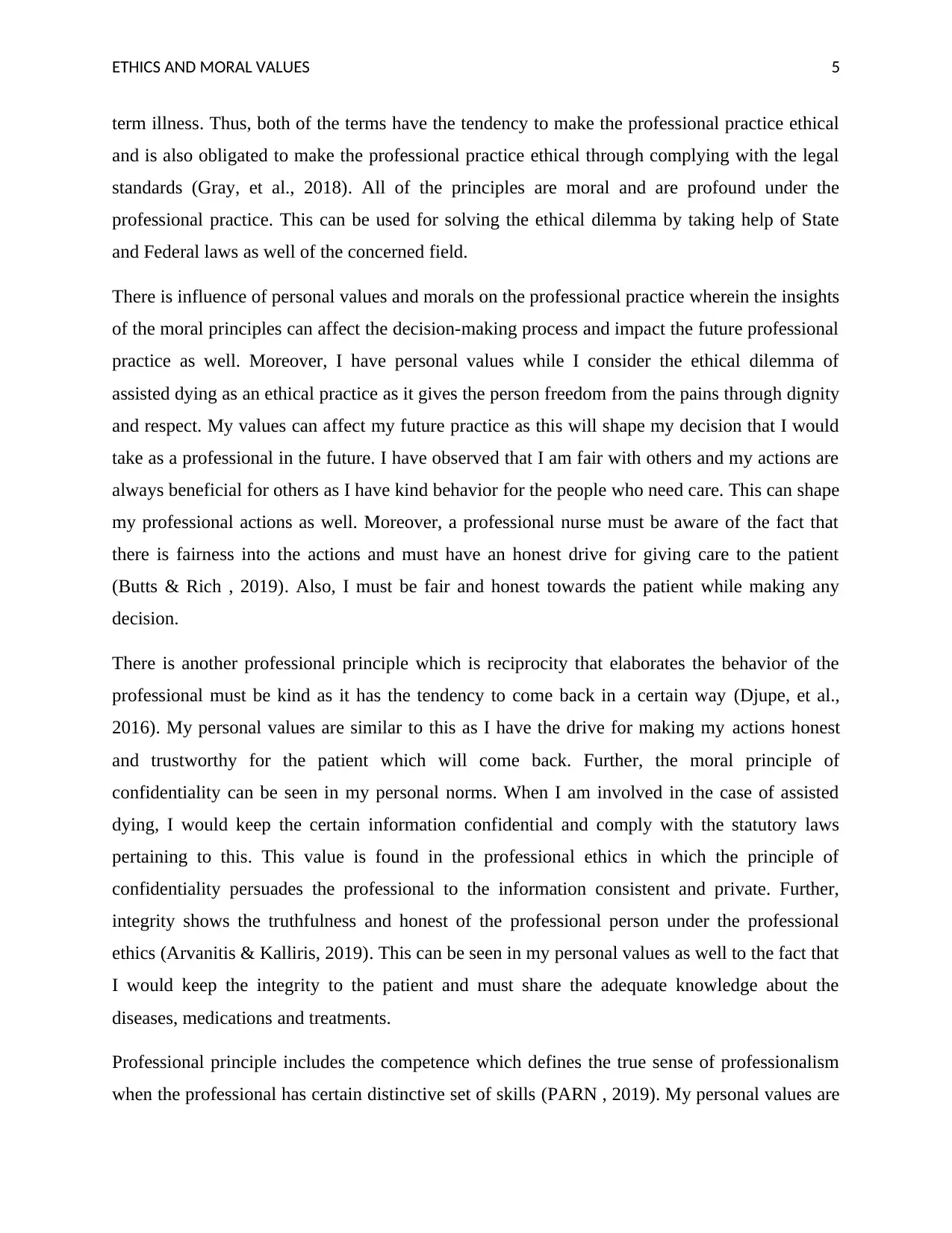
ETHICS AND MORAL VALUES 5
term illness. Thus, both of the terms have the tendency to make the professional practice ethical
and is also obligated to make the professional practice ethical through complying with the legal
standards (Gray, et al., 2018). All of the principles are moral and are profound under the
professional practice. This can be used for solving the ethical dilemma by taking help of State
and Federal laws as well of the concerned field.
There is influence of personal values and morals on the professional practice wherein the insights
of the moral principles can affect the decision-making process and impact the future professional
practice as well. Moreover, I have personal values while I consider the ethical dilemma of
assisted dying as an ethical practice as it gives the person freedom from the pains through dignity
and respect. My values can affect my future practice as this will shape my decision that I would
take as a professional in the future. I have observed that I am fair with others and my actions are
always beneficial for others as I have kind behavior for the people who need care. This can shape
my professional actions as well. Moreover, a professional nurse must be aware of the fact that
there is fairness into the actions and must have an honest drive for giving care to the patient
(Butts & Rich , 2019). Also, I must be fair and honest towards the patient while making any
decision.
There is another professional principle which is reciprocity that elaborates the behavior of the
professional must be kind as it has the tendency to come back in a certain way (Djupe, et al.,
2016). My personal values are similar to this as I have the drive for making my actions honest
and trustworthy for the patient which will come back. Further, the moral principle of
confidentiality can be seen in my personal norms. When I am involved in the case of assisted
dying, I would keep the certain information confidential and comply with the statutory laws
pertaining to this. This value is found in the professional ethics in which the principle of
confidentiality persuades the professional to the information consistent and private. Further,
integrity shows the truthfulness and honest of the professional person under the professional
ethics (Arvanitis & Kalliris, 2019). This can be seen in my personal values as well to the fact that
I would keep the integrity to the patient and must share the adequate knowledge about the
diseases, medications and treatments.
Professional principle includes the competence which defines the true sense of professionalism
when the professional has certain distinctive set of skills (PARN , 2019). My personal values are
term illness. Thus, both of the terms have the tendency to make the professional practice ethical
and is also obligated to make the professional practice ethical through complying with the legal
standards (Gray, et al., 2018). All of the principles are moral and are profound under the
professional practice. This can be used for solving the ethical dilemma by taking help of State
and Federal laws as well of the concerned field.
There is influence of personal values and morals on the professional practice wherein the insights
of the moral principles can affect the decision-making process and impact the future professional
practice as well. Moreover, I have personal values while I consider the ethical dilemma of
assisted dying as an ethical practice as it gives the person freedom from the pains through dignity
and respect. My values can affect my future practice as this will shape my decision that I would
take as a professional in the future. I have observed that I am fair with others and my actions are
always beneficial for others as I have kind behavior for the people who need care. This can shape
my professional actions as well. Moreover, a professional nurse must be aware of the fact that
there is fairness into the actions and must have an honest drive for giving care to the patient
(Butts & Rich , 2019). Also, I must be fair and honest towards the patient while making any
decision.
There is another professional principle which is reciprocity that elaborates the behavior of the
professional must be kind as it has the tendency to come back in a certain way (Djupe, et al.,
2016). My personal values are similar to this as I have the drive for making my actions honest
and trustworthy for the patient which will come back. Further, the moral principle of
confidentiality can be seen in my personal norms. When I am involved in the case of assisted
dying, I would keep the certain information confidential and comply with the statutory laws
pertaining to this. This value is found in the professional ethics in which the principle of
confidentiality persuades the professional to the information consistent and private. Further,
integrity shows the truthfulness and honest of the professional person under the professional
ethics (Arvanitis & Kalliris, 2019). This can be seen in my personal values as well to the fact that
I would keep the integrity to the patient and must share the adequate knowledge about the
diseases, medications and treatments.
Professional principle includes the competence which defines the true sense of professionalism
when the professional has certain distinctive set of skills (PARN , 2019). My personal values are
⊘ This is a preview!⊘
Do you want full access?
Subscribe today to unlock all pages.

Trusted by 1+ million students worldwide
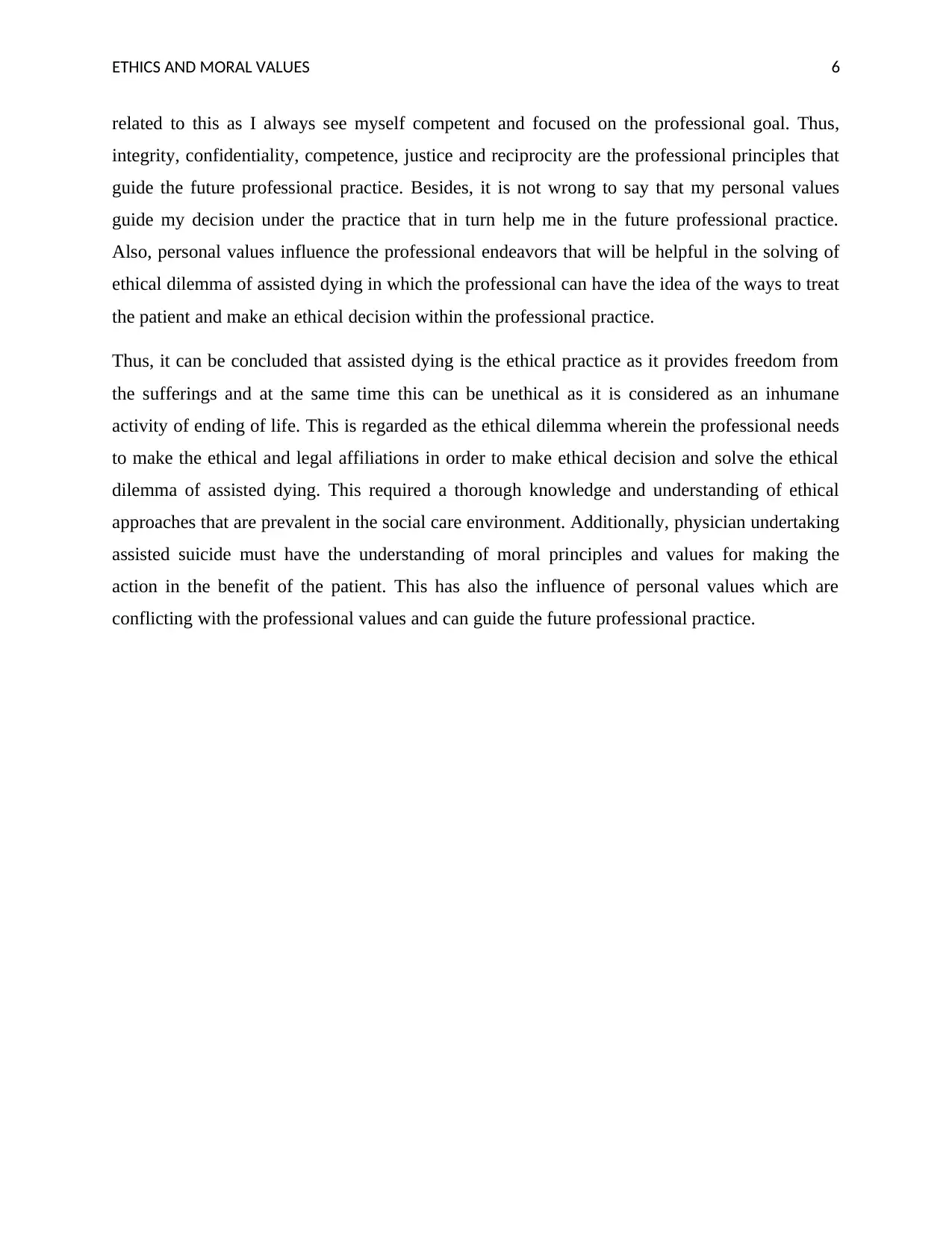
ETHICS AND MORAL VALUES 6
related to this as I always see myself competent and focused on the professional goal. Thus,
integrity, confidentiality, competence, justice and reciprocity are the professional principles that
guide the future professional practice. Besides, it is not wrong to say that my personal values
guide my decision under the practice that in turn help me in the future professional practice.
Also, personal values influence the professional endeavors that will be helpful in the solving of
ethical dilemma of assisted dying in which the professional can have the idea of the ways to treat
the patient and make an ethical decision within the professional practice.
Thus, it can be concluded that assisted dying is the ethical practice as it provides freedom from
the sufferings and at the same time this can be unethical as it is considered as an inhumane
activity of ending of life. This is regarded as the ethical dilemma wherein the professional needs
to make the ethical and legal affiliations in order to make ethical decision and solve the ethical
dilemma of assisted dying. This required a thorough knowledge and understanding of ethical
approaches that are prevalent in the social care environment. Additionally, physician undertaking
assisted suicide must have the understanding of moral principles and values for making the
action in the benefit of the patient. This has also the influence of personal values which are
conflicting with the professional values and can guide the future professional practice.
related to this as I always see myself competent and focused on the professional goal. Thus,
integrity, confidentiality, competence, justice and reciprocity are the professional principles that
guide the future professional practice. Besides, it is not wrong to say that my personal values
guide my decision under the practice that in turn help me in the future professional practice.
Also, personal values influence the professional endeavors that will be helpful in the solving of
ethical dilemma of assisted dying in which the professional can have the idea of the ways to treat
the patient and make an ethical decision within the professional practice.
Thus, it can be concluded that assisted dying is the ethical practice as it provides freedom from
the sufferings and at the same time this can be unethical as it is considered as an inhumane
activity of ending of life. This is regarded as the ethical dilemma wherein the professional needs
to make the ethical and legal affiliations in order to make ethical decision and solve the ethical
dilemma of assisted dying. This required a thorough knowledge and understanding of ethical
approaches that are prevalent in the social care environment. Additionally, physician undertaking
assisted suicide must have the understanding of moral principles and values for making the
action in the benefit of the patient. This has also the influence of personal values which are
conflicting with the professional values and can guide the future professional practice.
Paraphrase This Document
Need a fresh take? Get an instant paraphrase of this document with our AI Paraphraser
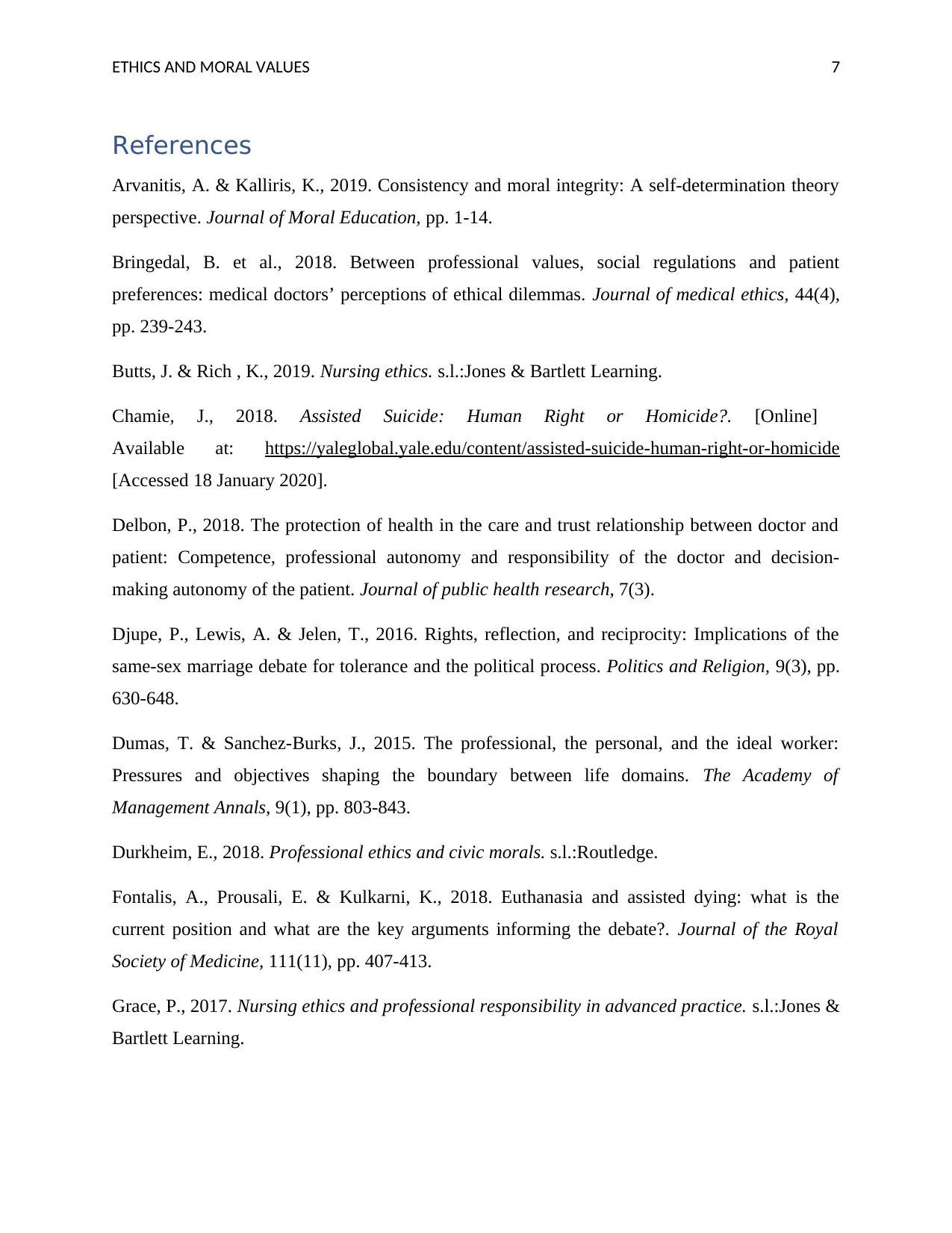
ETHICS AND MORAL VALUES 7
References
Arvanitis, A. & Kalliris, K., 2019. Consistency and moral integrity: A self-determination theory
perspective. Journal of Moral Education, pp. 1-14.
Bringedal, B. et al., 2018. Between professional values, social regulations and patient
preferences: medical doctors’ perceptions of ethical dilemmas. Journal of medical ethics, 44(4),
pp. 239-243.
Butts, J. & Rich , K., 2019. Nursing ethics. s.l.:Jones & Bartlett Learning.
Chamie, J., 2018. Assisted Suicide: Human Right or Homicide?. [Online]
Available at: https://yaleglobal.yale.edu/content/assisted-suicide-human-right-or-homicide
[Accessed 18 January 2020].
Delbon, P., 2018. The protection of health in the care and trust relationship between doctor and
patient: Competence, professional autonomy and responsibility of the doctor and decision-
making autonomy of the patient. Journal of public health research, 7(3).
Djupe, P., Lewis, A. & Jelen, T., 2016. Rights, reflection, and reciprocity: Implications of the
same-sex marriage debate for tolerance and the political process. Politics and Religion, 9(3), pp.
630-648.
Dumas, T. & Sanchez-Burks, J., 2015. The professional, the personal, and the ideal worker:
Pressures and objectives shaping the boundary between life domains. The Academy of
Management Annals, 9(1), pp. 803-843.
Durkheim, E., 2018. Professional ethics and civic morals. s.l.:Routledge.
Fontalis, A., Prousali, E. & Kulkarni, K., 2018. Euthanasia and assisted dying: what is the
current position and what are the key arguments informing the debate?. Journal of the Royal
Society of Medicine, 111(11), pp. 407-413.
Grace, P., 2017. Nursing ethics and professional responsibility in advanced practice. s.l.:Jones &
Bartlett Learning.
References
Arvanitis, A. & Kalliris, K., 2019. Consistency and moral integrity: A self-determination theory
perspective. Journal of Moral Education, pp. 1-14.
Bringedal, B. et al., 2018. Between professional values, social regulations and patient
preferences: medical doctors’ perceptions of ethical dilemmas. Journal of medical ethics, 44(4),
pp. 239-243.
Butts, J. & Rich , K., 2019. Nursing ethics. s.l.:Jones & Bartlett Learning.
Chamie, J., 2018. Assisted Suicide: Human Right or Homicide?. [Online]
Available at: https://yaleglobal.yale.edu/content/assisted-suicide-human-right-or-homicide
[Accessed 18 January 2020].
Delbon, P., 2018. The protection of health in the care and trust relationship between doctor and
patient: Competence, professional autonomy and responsibility of the doctor and decision-
making autonomy of the patient. Journal of public health research, 7(3).
Djupe, P., Lewis, A. & Jelen, T., 2016. Rights, reflection, and reciprocity: Implications of the
same-sex marriage debate for tolerance and the political process. Politics and Religion, 9(3), pp.
630-648.
Dumas, T. & Sanchez-Burks, J., 2015. The professional, the personal, and the ideal worker:
Pressures and objectives shaping the boundary between life domains. The Academy of
Management Annals, 9(1), pp. 803-843.
Durkheim, E., 2018. Professional ethics and civic morals. s.l.:Routledge.
Fontalis, A., Prousali, E. & Kulkarni, K., 2018. Euthanasia and assisted dying: what is the
current position and what are the key arguments informing the debate?. Journal of the Royal
Society of Medicine, 111(11), pp. 407-413.
Grace, P., 2017. Nursing ethics and professional responsibility in advanced practice. s.l.:Jones &
Bartlett Learning.
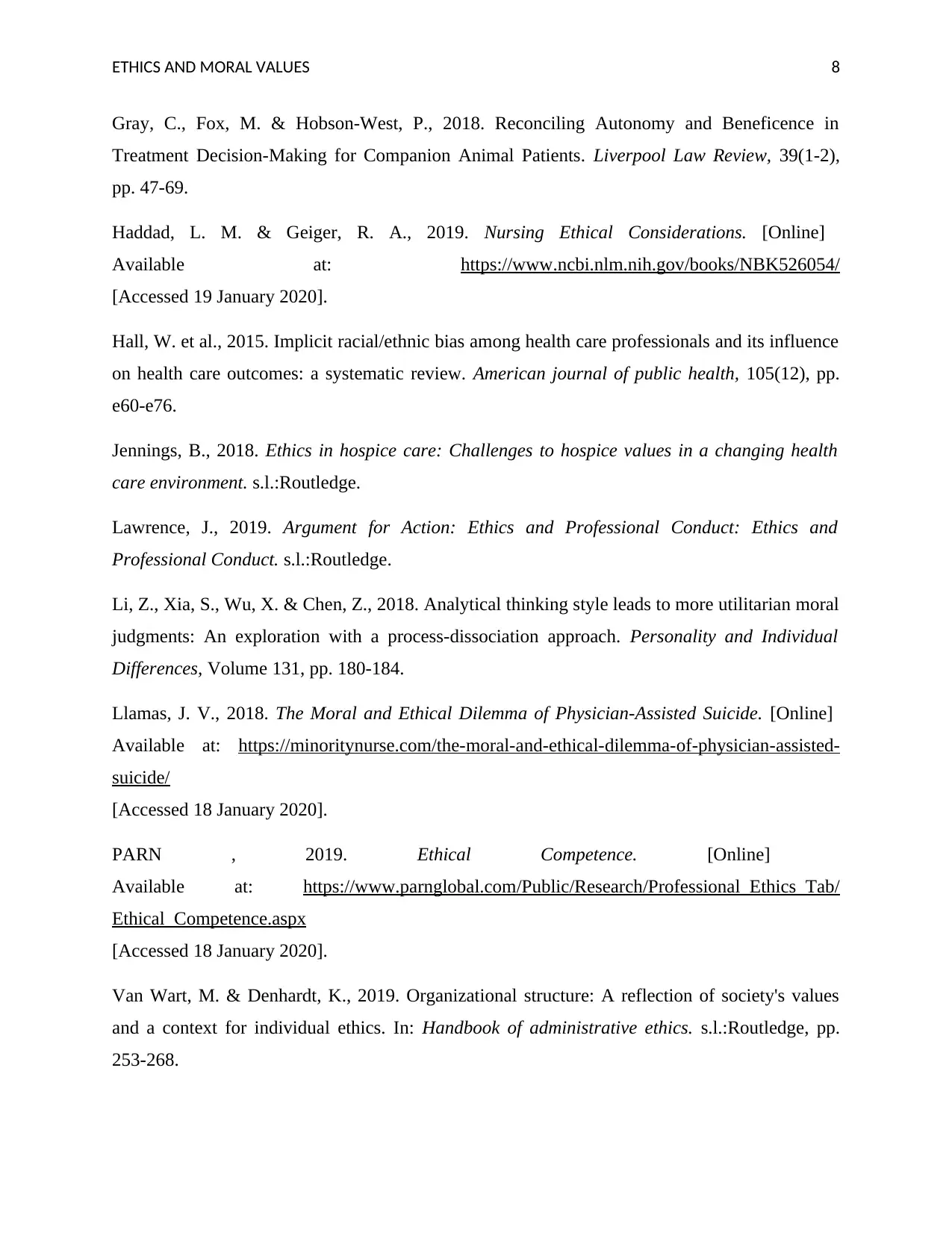
ETHICS AND MORAL VALUES 8
Gray, C., Fox, M. & Hobson-West, P., 2018. Reconciling Autonomy and Beneficence in
Treatment Decision-Making for Companion Animal Patients. Liverpool Law Review, 39(1-2),
pp. 47-69.
Haddad, L. M. & Geiger, R. A., 2019. Nursing Ethical Considerations. [Online]
Available at: https://www.ncbi.nlm.nih.gov/books/NBK526054/
[Accessed 19 January 2020].
Hall, W. et al., 2015. Implicit racial/ethnic bias among health care professionals and its influence
on health care outcomes: a systematic review. American journal of public health, 105(12), pp.
e60-e76.
Jennings, B., 2018. Ethics in hospice care: Challenges to hospice values in a changing health
care environment. s.l.:Routledge.
Lawrence, J., 2019. Argument for Action: Ethics and Professional Conduct: Ethics and
Professional Conduct. s.l.:Routledge.
Li, Z., Xia, S., Wu, X. & Chen, Z., 2018. Analytical thinking style leads to more utilitarian moral
judgments: An exploration with a process-dissociation approach. Personality and Individual
Differences, Volume 131, pp. 180-184.
Llamas, J. V., 2018. The Moral and Ethical Dilemma of Physician-Assisted Suicide. [Online]
Available at: https://minoritynurse.com/the-moral-and-ethical-dilemma-of-physician-assisted-
suicide/
[Accessed 18 January 2020].
PARN , 2019. Ethical Competence. [Online]
Available at: https://www.parnglobal.com/Public/Research/Professional_Ethics_Tab/
Ethical_Competence.aspx
[Accessed 18 January 2020].
Van Wart, M. & Denhardt, K., 2019. Organizational structure: A reflection of society's values
and a context for individual ethics. In: Handbook of administrative ethics. s.l.:Routledge, pp.
253-268.
Gray, C., Fox, M. & Hobson-West, P., 2018. Reconciling Autonomy and Beneficence in
Treatment Decision-Making for Companion Animal Patients. Liverpool Law Review, 39(1-2),
pp. 47-69.
Haddad, L. M. & Geiger, R. A., 2019. Nursing Ethical Considerations. [Online]
Available at: https://www.ncbi.nlm.nih.gov/books/NBK526054/
[Accessed 19 January 2020].
Hall, W. et al., 2015. Implicit racial/ethnic bias among health care professionals and its influence
on health care outcomes: a systematic review. American journal of public health, 105(12), pp.
e60-e76.
Jennings, B., 2018. Ethics in hospice care: Challenges to hospice values in a changing health
care environment. s.l.:Routledge.
Lawrence, J., 2019. Argument for Action: Ethics and Professional Conduct: Ethics and
Professional Conduct. s.l.:Routledge.
Li, Z., Xia, S., Wu, X. & Chen, Z., 2018. Analytical thinking style leads to more utilitarian moral
judgments: An exploration with a process-dissociation approach. Personality and Individual
Differences, Volume 131, pp. 180-184.
Llamas, J. V., 2018. The Moral and Ethical Dilemma of Physician-Assisted Suicide. [Online]
Available at: https://minoritynurse.com/the-moral-and-ethical-dilemma-of-physician-assisted-
suicide/
[Accessed 18 January 2020].
PARN , 2019. Ethical Competence. [Online]
Available at: https://www.parnglobal.com/Public/Research/Professional_Ethics_Tab/
Ethical_Competence.aspx
[Accessed 18 January 2020].
Van Wart, M. & Denhardt, K., 2019. Organizational structure: A reflection of society's values
and a context for individual ethics. In: Handbook of administrative ethics. s.l.:Routledge, pp.
253-268.
⊘ This is a preview!⊘
Do you want full access?
Subscribe today to unlock all pages.

Trusted by 1+ million students worldwide

ETHICS AND MORAL VALUES 9
1 out of 10
Related Documents
Your All-in-One AI-Powered Toolkit for Academic Success.
+13062052269
info@desklib.com
Available 24*7 on WhatsApp / Email
![[object Object]](/_next/static/media/star-bottom.7253800d.svg)
Unlock your academic potential
Copyright © 2020–2026 A2Z Services. All Rights Reserved. Developed and managed by ZUCOL.




